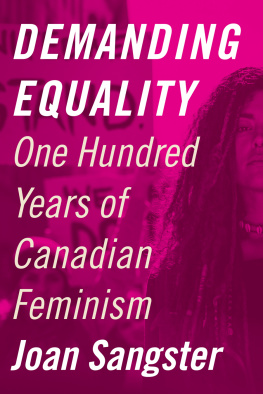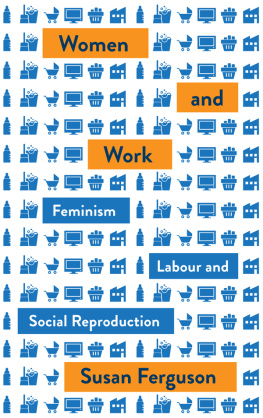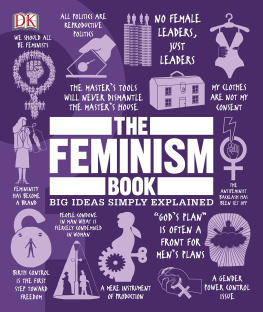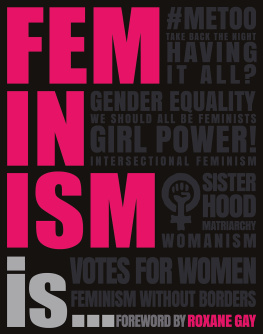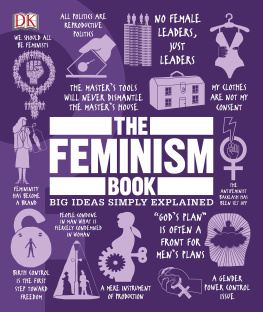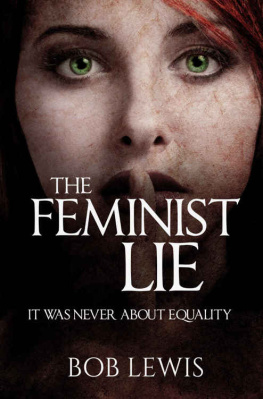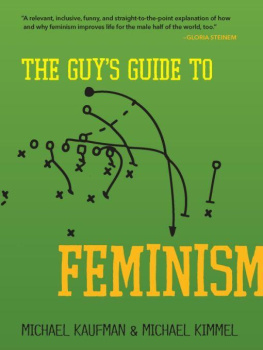Acknowledgments
This is a book that seems decades in the making. It reflects years of teaching and researching womens history, as well as more recent research in and re-thinking of that history. It also resonates with my own feminist history, since our intellectual and social positions are inevitably imprinted, in both conscious and unconscious ways, on what we create. It seemed ironic to me that one anonymous reviewer of the manuscript thought I should remove all first person and personal references in the book as they are indulgent afterthoughts. After all, for decades feminists have said it is only right and proper to indicate where we have come from. Perhaps the reviewers remark had something to do with their accompanying assumptions about, and criticisms of, sixties feminists. However, a sixties feminist I am not: I wish I had been that politically aware in the sixties when I became a teenager. It took me longer, until the late 1970s, when I was a graduate student, to completely embrace feminism and other radical movements, though my curiosity and sympathies were already engaged.
You might characterize me as a seventies socialist feminist, but my ideas, intellectual influences, and the causes I have cared about or been involved in have of course developed and shifted with changing theoretical and political concerns. Like many socialist feminists, I was shaped by my social origins, location, and the political times: I was a product of the post-war aspiring white middle-class but also, thankfully, of social movements, of challenges to my ideas, of new ways of seeing the world. If there is one constant since the seventies, it might be my love of history combined with the anticipation that rewriting our understanding of the past with attention to questions about power, exploitation, oppression, inequality, and resistance matters, and might even make a difference. This book is written as an introduction to the subject rather than a definitive statement, and I hope it encourages readers to see there is so much more to explore, to write, to question, to demand, in the multiple histories of womens equality seeking.
In putting this manuscript together, I received generous advice, encouragement, and aid. First, thanks go to the Social Science and Humanities Research Council and Trent Universitys internal research grants for financial support. Graduate students I worked with while writing the book provoked my thinking and some helped with research: thanks to Sean Antaya, Sean Carleton, Mason Godden, Sarah Jessup, Morgana Malyon, James Onusko, Julia Smith, and Christine Sy. While completing this book, Julia Smith and I were engaged in a concurrent labour history project that has stimulated my ideas on the history of feminism and also has been just plain fun. Colleagues writing in similar areas offered suggestions and shared their own writing with me; I am grateful to Penny Bryden, Lara Campbell, Lori Chambers, Sarah Carter, Meg Luxton, Kirk Niergarth, Ted McCoy, Lisa Pasolli, and Veronica Strong-Boag. Historians outside Canada also provided trans-national, comparative feedback: thanks to Dorothy Sue Cobble, Lucy Delap, June Hannam, Alice Kessler-Harris, Silke Neunsinger, Ragnheiur Kristjnsdttir, and Erla Hulda Halldrsdttir. At the end of the project, when Covid-19 prevented me from travelling to archives to collect photos, Tarah Brookfield, Barbara Freeman, Andre Lvesque, Mary Bissell, and Karen Teeple found and shared photos with me. Archives across the country have been critical to this project; I want to thank all of them collectively but give a special shout out to the great work done at Canadian Womens Movement Archives at the University of Ottawa and on the Rise Up! Feminism Digital archive website.
In crossing the country to collect research material and give talks, friends and colleagues have put me up and cheered me up: a special thanks to my long-standing Halifax confrres, Janet Guildford, Judith Fingard, and Frances Early, who provided solace and laughter when I broke my foot the first day at the archives, and also to Meaghan Beaton, Alvin Finkel, Betsy Jameson, Mark Leier, Linda and Greg Kealey, Valerie Korinek, Heather Murray, Karen Teeple, Kay Teschke, and Keith Walden. During my writing, Charles Smith, my coeditor at Labour/Le Travail, has made that collaboration thoroughly enjoyable, and members of my recent discussion group Abbie Bakan, Elaine Coburn, Sedef Arat-Koc, Meg Luxton, and Bonnie Fox have prodded my thoughts on theoretical questions. I also want to acknowledge Trent friends who weathered some final storms with me: Dimitry Anastakis, Gillian Balfour, Molly Blyth, Caroline Durand, Winnie Lem, Barb Marshall, Janet Miron, Patricia Morton, Colleen OManique, and Elaine Stavro.
Working with UBC Press senior editor Randy Schmidt has been a pleasure, and other UBC staff, including Darcy Cullen, Carmen Tiampo, Michelle van der Merwe, and Barbara Tessman, have been professional, helpful, and supportive.
No one has been more present, intellectually and personally, throughout this project than my partner, Bryan Palmer, who has always challenged my thinking (and, I think, I have his), while offering unending love and support. As we begin a new life in the backcountry, I can only hope for many more years of the same. The isolation of the Covid-19 lockdown kept us from contact with our children and grandchildren, making us realize how important they are to our enjoyment of life. We both hold out hopes that the struggle for radical change might alter their futures and that of their generation. This book is dedicated to them: Kate, Beth, Laura, and Rob.
1
Spreading the Word of Womens Emancipation
As a radical free thinker, Quebec journalist va Circ-Ct was used to public criticism. She wrote for dissenting, liberal, secular publications, started her own independent journal, and delivered public lectures on social issues, including one on the the causes of the inferiority of women. Defending herself against a male writer who denounced her feminist ideas, she responded indignantly that she was a humanist, not a feminist. Her earliest writing disparaged feminism yet, at the same time, advocated equal education for girls. In a public lecture on womens equality, she reassured men of womans role as helpmate: Gentlemen do not think me a revolutionary because I put forward the educated woman as an ideal; the goal is your happiness Just like you sir, we have an immortal soul and an intelligence destined to the same end.
How do we assess apparently contradictory impulses in her writing? Do we see her as an early feminist? The answer to the second question is yes; as to the first, she was not unusual in her ambivalent, changing, and, to our eyes, contradictory views. Indeed, she represents an essential beginning to the story of feminism: women who craved intellectual exploration, who questioned the masculine definition of humanity, who used the pen and press to ask if the condition of women was natural, moral, and just.
In the beginning was the printed word. Print culture was an incubator of early feminist thought, from late eighteenth-century Enlightenment treatises to womens columns in daily newspapers a century later. Pamphlets, books, newspapers, and magazines circulated across borders and oceans, conveying new questions, ideas, and visions of social life. The word feminism was not in common usage until the end of the nineteenth century, but the concept of womens rights, equality, emancipation, or even the wrongs visited upon women was transmitted through print culture prior to that. The electricity generated by these ideas was not the only incubator for feminism. It emerged, too, out of changing social and material conditions of life, both for more privileged women and the working classes, as household and paid labour changed significantly, as did womens social lives, cultural connections, and, for some women, educational prospects.

